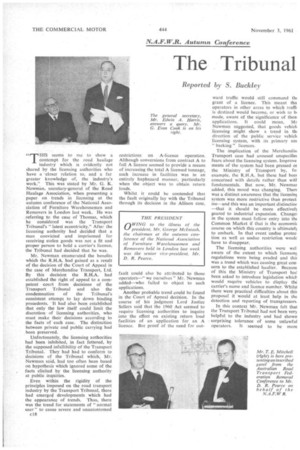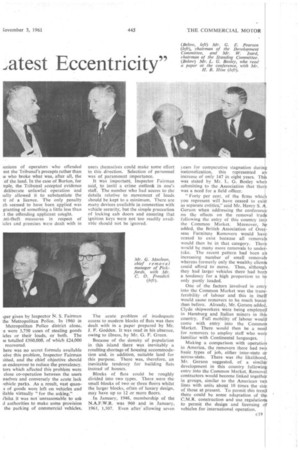The Tribunal datest Eccentricity"
Page 54

Page 55

If you've noticed an error in this article please click here to report it so we can fix it.
Reported by S. Buckley
"THIS seems to me to show a contempt for the road haulage industry which is evidently not shared by the licensing authorities who have a closer relation to, and a far greater knowledge of, the industry's work." This was stated by Mr. G. K. Newman, secretary-general of the Road Haulage Association, when presenting a paper on trends in licensing at the autumn conference of the National Association of Furniture Warehousemen and Removers in London last week. He was referring to the case of Thomas, which he considered was the Transport Tribunal's "latest eccentricity." After the licensing authority had decided that a man convicted and imprisoned for receiving stolen goods was not a fit and proper person to hold a carrier's licence, the Tribunal had decided that he was.
Mr. Newman enumerated the benefits which the R.H.A. had gained as a result of the decision of the Court of Appeal in the case of Merchandise Transport, Ltd. By this decision the R.H.A. had established the right of appeal to a competent court from decisions of the Transport Tribunal and also the condemnation of the Tribunal's consistent attempt to lay down binding precedents. it had also been established that only the law itself could limit the discretion • of licensing authorities, who must make their decisions according to the facts of each case. The distinction between private and public carrying had been preserved.
Unfortunately, the licensing authorities had been inhibited, in fact fettered, by the supposed infallibility of the Transport Tribunal. They had had to conform to decisions of the Tribunal which, Mr. Newman said, had too often been based on hypothesis which ignored some of the facts elicited by the licensing authority at public inquiries.
Even within the rigidity of the principles imposed on the road transport industry by the Transport Tribunal, there had emerged developments which had the appearance of trends. Thus, there was the trend for statements of "normal user" to cause severe and unaccustomed c18 restrictions on A-licence operation. Although conversions from contract A to full A licence seemed to provide a means of increasing the total A licensed tonnage, such increase in facilities was in an entirely haphazard manner, particularly when the object was to obtain return loads.
Whilst it could be contended that the fault originally lay with the Tribunal through its decision in the Allison case, fault could also be attributed to those operators—" we ourselves" Mr. Newman added—who failed to object to such applications.
Another probable trend could be found in the Court of Appeal decision. In the course of his judgment Lord Justice Sellers said that the 1960 Act seemed to require licensing authorities to inquire into the effect on existing return load facilities of an application for an A licence. But proof of the need for out
ward traffic would still command tin grant of a licence, This meant tha operators in other areas to which traffi is destined would become, or wish to b. made, aware of the significance of thosi applications. it could mean, Mr Newman suggested, that goods vehicli licensing might show a trend in till direction of the public service vehicli licensing system, with its primary am " backing " licences.
The implication of the Merchandiss Transport case had aroused unspecifiec fears about the licensing system. Improve ments of the system had been pressed or the Ministry of Transport by, fo, example, the R.H.A. but these had beer concerned with details rather than witt fundamentals. But now, Mr. Newrnar added, this mood was changing. Then was a distinct awareness that the licensirn system was more restrictive than protect lye—and this was an important distinctior —that it should be more effective() geared to industrial expansion. Change! in the system must follow entry into th( Common Market if that is the economic course on which this country is ultimateI3 to embark. In that event undue protec. tion as well as undue restriction woule have to disappear.
The licensing authorities were wel aware of the extent to which licensing regulations were being evaded and this was a trend which was causing great concern to the established haulier. Becausc of this the Ministry of Transport had been asked to introduce legislation which would require vehicles to display thc carrier's name and licence number. Whilst there were practical difficulties about this proposal it would at least help in the detection and reporting of transgressors.
In this context Mr. Newman felt that the Transport Tribunal had not been very helpful to the industry and had shown surprising tolerance of some unlawful operators. It seemed to be more torious of operators who offended nst the Tribunal's precepts rather than te who broke what was, after all, the of the land. In the case of Burton, for nple, the Tribunal accepted evidence deliberate unlawful operation and tally allowed it to substantiate the It of a licence. The only penalty eh seemed to have been applied was granting of something a little less than t the offending applicant sought.
nti-theft measures in respect of idles and premises were dealt with in tper given by Inspector N. S. Fairman the Metropolitan Police. In 1960 in Metropolitan Police district alone, .e were 3,750 cases of stealing goods ides or their loads, or both. The te totalled £560,000, of which £24,000 recovered.
here was no secret formula available olve this problem, Inspector Fairman lilted, and the chief objective should in endeavour to reduce the prevalency. tors which affected this problem were close co-operation between the users nselves and conversely the acute lack rehicle parks. As a result, vast quans of goods were left on vehicles and ilable virtually "for the asking." ihilst it was not 'unreasonable to ask d authorities to make some provision the parking of commercial vehicles,
users themselves could make some effort in this direction. Selection of personnel was of paramount importance.
It was important, Inspector Fain/Ian said, to instil a crime outlook in one's staff. The number who had access to the details relative to movement of loads should be kept to a minimum. There are many devices available in connection with vehicle security, but the simple precaution of locking cab doors and ensuring that ignition keys were not too readily available should not be ignored.
The acute problem of inadequate access to modern blocks of flats was then dealt with in a paper prepared by Mr. J. F. Godden. It was read in his absence, owing to illness, by Mr. G. F. Green.
Because of the density of population in this island there was inevitably a resulting shortage of housing accommodation and, in addition, suitable land for this purpose. There was, therefore, an inevitable tendency for building flats instead of houses.
Blocks of flats could be roughly divided into two types. There were the small blocks of two or three floors whilst the larger blocks, often of luxury design, may have up to 12 or more floors.
In January, 1946, membership of the N.A.F.W.R. was 960 and in January, 1961, 1,107. Even after' allowing seven ears for comparative stagnation durin
nationvlization, this represented a increase of only 147 in eight years. Th. was stated by Mr. L. G. Bosley whe submitting to the Association that ther was a need for a field officer,
"Forty per cent, of the firms whic you represent will have ceased to exi t as separate entities," said Mr. Henry S. Gerson when addressing the conferenc on the effects on the removal trad following the entry of this country int the Common Market. Moreover, b added, the British Association of Ove seas Furniture Removers would hay ceased to exist because all remova would then be in that category. Ther would be many more removals to unde take. The recent pattern had been a increasing number of small remova whereas formerly only the wealthy clien could afford to move. Thus, althoug they had larger vehicles there had bee a tendency for a high proportion to b only partly loaded.
One of the factors involved in entr into the Common Market was the tran ferability of labour and this in itsel would cause removers to be much busi than before. Already, Mr. Gerson adde Clyde shipworkers were being employe in Hamburg and Italian miners in th s country. Full mobility of labour woul come with entry into the Commo Market. There would then be a nee for removers to employ staff who wer familiar with Continental languages.
Making a comparison with operatio in America, the removers there had tw basic types of job, either inter-state across-state. There was the likelihoo Mr. Gerson suggested, of a simil development in this country followin entry into the Common Market, Remov. 1 contractors would become linked togeth in groups, similar to the American va lines with units about 10 times the si of those at present. To permit this tren there could be some adaptation of t C.M.R. construction and use regulatio to permit the design and licensing vehicles for international operation.
























































































































